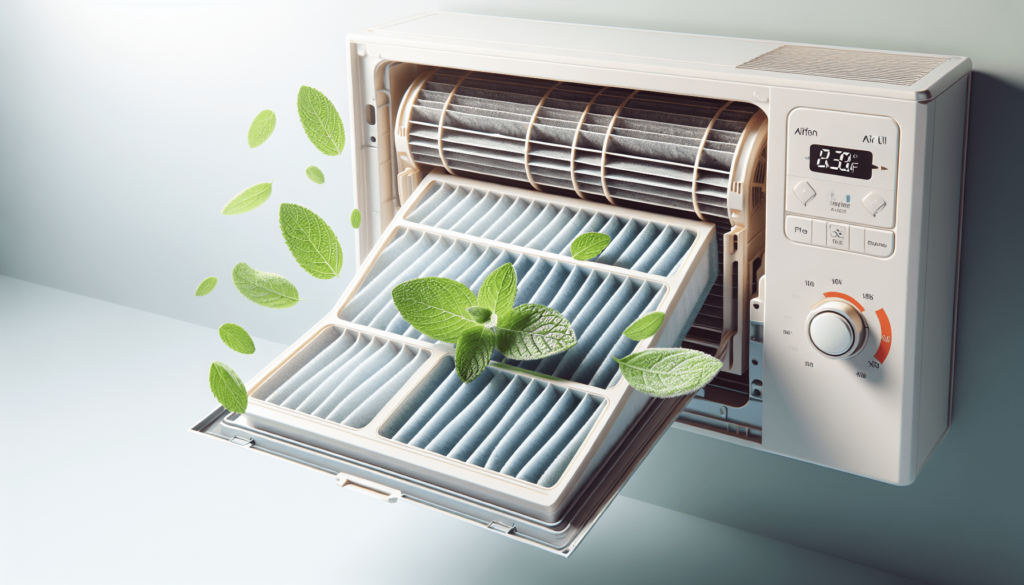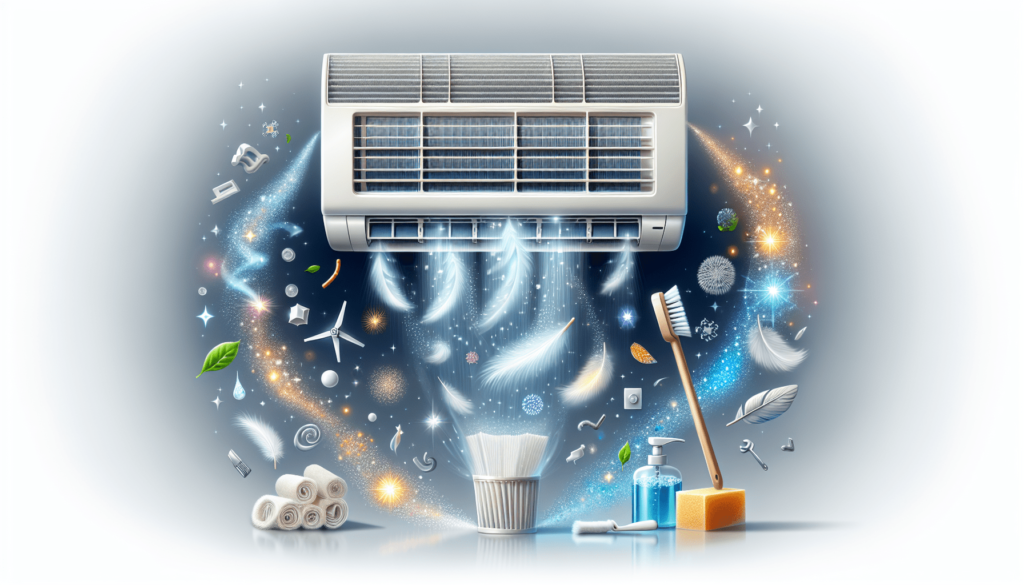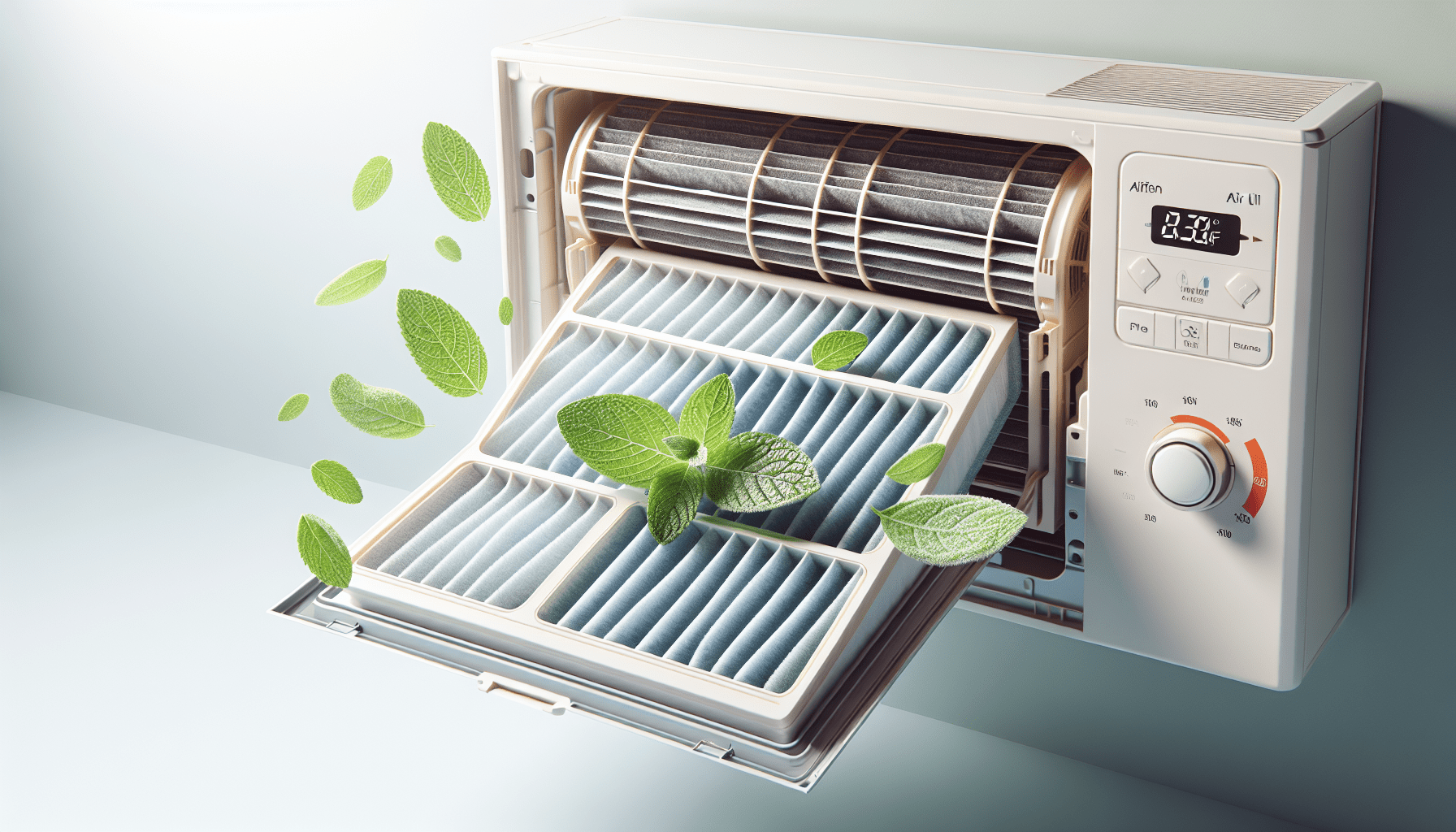Maintaining clean air filters for your mini split air conditioner is crucial for ensuring better air quality in your home. By regularly cleaning and maintaining your air filters, you can prevent dust, pollen, and other particles from circulating throughout your living space, which can lead to allergies and respiratory issues. In this article, you will discover simple yet effective tips on how to maintain and clean your mini split air filters, ultimately improving the air you breathe and creating a healthier environment for you and your family.

This image is property of pixabay.com.
Understanding the Importance of Clean Air Filters
Role of air filters in air quality
Air filters play a crucial role in maintaining the quality of the air we breathe. They are designed to trap dust, dirt, pollen, pet dander, and other airborne particles that can negatively impact air quality. By capturing these pollutants, air filters help to improve indoor air quality and create a healthier living environment.
Implications of dirty or clogged air filters
When air filters become dirty or clogged, their ability to effectively capture and trap pollutants is compromised. This can lead to a variety of problems, including reduced airflow, decreased cooling or heating efficiency, and increased energy consumption. Additionally, dirty air filters can harbor bacteria, mold, and other harmful microorganisms, which can contribute to respiratory issues and allergies.
Health benefits of clean air filters
Maintaining clean air filters has numerous health benefits. Firstly, clean air filters help to reduce the presence of allergens in the air, such as pollen and dust mites, which can trigger allergies and worsen respiratory conditions. Additionally, clean air filters can help to alleviate symptoms of asthma and other respiratory illnesses by improving the overall air quality and ensuring that the air we breathe is free from harmful particles.
Getting To Know Your Mini Split Air Filter
Types of mini split air filters
There are generally two types of air filters used in mini split systems: reusable filters and disposable filters. Reusable filters are made from materials such as fiberglass or synthetic fibers and can be washed and reused multiple times. Disposable filters, on the other hand, are made from materials like pleated paper or polyester and need to be replaced at regular intervals.
Location of the air filter in your unit
The location of the air filter within your mini split unit can vary depending on the model and make. In most cases, the air filter is located behind a front panel or grille on the indoor unit. It is important to refer to the manufacturer’s instructions or consult a professional if you are unsure about the exact location of your air filter.
Lifespan and replacement frequency of air filters
The lifespan of an air filter can vary depending on multiple factors, including the type of filter, the quality of the surrounding air, and the frequency of use. Reusable filters typically have a longer lifespan than disposable filters, but both need to be regularly inspected and maintained. As a general rule, disposable filters should be replaced every three to six months, while reusable filters should be cleaned every one to three months.
Safety Precautions Before Cleaning
Switch off the power
Before attempting to clean your mini split air filter, it is essential to switch off the power to the unit. This will prevent any potential accidents or damage to the system during the cleaning process. Locate the circuit breaker for your mini split system and turn it off before proceeding with any maintenance tasks.
Safety equipment needed
While cleaning your mini split air filter may seem like a simple task, it is important to take necessary safety precautions. Wear gloves and a mask to protect yourself from any potential allergens or harmful particles that may be present in the filter. Additionally, consider using safety goggles to shield your eyes from any debris that may be dislodged during the cleaning process.
Handling of dirty filters
When handling dirty filters, it is essential to be careful and avoid spreading any dust or debris. Place the dirty filter into a plastic bag to contain any loose particles and prevent them from being released into the surrounding area. Dispose of the bag properly, following local regulations for the disposal of air filters.
Step-by-Step Guide to Cleaning Reusable Filters
Removing filters from unit
To clean a reusable mini split air filter, start by removing it from the unit. Refer to the manufacturer’s instructions for your specific unit to determine the best method for filter removal. In most cases, the filter can be easily accessed by removing the front panel or grille of the indoor unit. Gently pull out the filter, being careful not to damage it in the process.
Rinsing with warm water
Once the filter is removed, rinse it thoroughly with warm water. Place the filter under a gentle stream of water to wash away dirt, dust, and other debris. Be sure to rinse both sides of the filter until the water runs clear and all visible dirt is removed. Avoid using hot water, as it may damage the filter or reduce its effectiveness.
Using mild detergent if necessary
If the filter is particularly dirty or has stubborn stains, you can use a mild detergent to help remove them. Fill a basin or sink with warm water and add a small amount of mild dish soap or laundry detergent. Submerge the filter in the soapy water and gently agitate it to loosen any dirt or debris. Rinse the filter thoroughly to remove any soap residue before proceeding to the next step.
Drying filters completely before reinserting
After rinsing the filter, it is crucial to allow it to dry completely before reinserting it into the mini split unit. Place the filter in a well-ventilated area or outdoors, away from direct sunlight. Allow it to air dry naturally, ensuring that both sides are thoroughly dry. It is important to avoid rushing the drying process or using any heat sources, as they may cause damage to the filter.

This image is property of pixabay.com.
Replacing Disposable Filters
Knowing when to replace instead of clean
Unlike reusable filters, disposable filters are not designed to be cleaned and reused. To ensure optimal air quality and system performance, it is necessary to replace disposable filters at regular intervals. Signs that indicate the need for replacement include visible signs of dirt or damage, reduced airflow, and an increase in dust or allergy symptoms despite regular cleaning.
Choosing the right replacement filter
When replacing a disposable filter, it is essential to choose the right type and size for your mini split unit. Refer to the manufacturer’s instructions or consult a professional to determine the appropriate filter specifications. Consider factors such as filter efficiency (measured by the Minimum Efficiency Reporting Value or MERV rating) and the specific needs of your indoor environment.
Proper installation of new filter
To install a new disposable filter, start by locating the filter slot or compartment in the mini split unit. Carefully insert the new filter, ensuring that it is positioned correctly and securely. Follow the airflow direction indicated on the filter to ensure optimal performance. Once the new filter is in place, replace the front panel or grille of the indoor unit and securely fasten it.
Regular Maintenance Schedule
Recommended frequency for cleaning
To maintain excellent air quality and maximize the lifespan of your mini split air filters, it is crucial to establish a regular maintenance schedule. As a general guideline, reusable filters should be cleaned every one to three months, while disposable filters should be replaced every three to six months. However, specific factors such as air quality, usage, and presence of pets may require more frequent maintenance.
Factors affecting cleaning frequency
Several factors can influence how often you need to clean or replace your mini split air filters. These factors include the level of indoor and outdoor air pollution, the presence of pets or smokers in the household, the frequency of system use, and the location of the unit (e.g., a dusty environment or proximity to construction sites). Regular inspection of the filters can help determine if cleaning or replacement is necessary ahead of schedule.
Setting reminders for regular maintenance
To ensure that you do not forget to clean or replace your mini split air filters, it can be helpful to set reminders or establish a routine. You can use calendar applications on your smartphone or computer to schedule recurring reminders. Alternatively, you can associate the maintenance tasks with other routines, such as changing the batteries in your smoke detectors or conducting regular home inspections.

This image is property of pixabay.com.
Professional Cleaning and Maintenance
When to consider professional maintenance
While regular cleaning and maintenance can be performed by homeowners, there may be instances where professional assistance is necessary. If you are uncertain about how to properly clean or replace your mini split air filters, it is advisable to seek the help of a qualified HVAC technician. Additionally, if you notice any issues with your mini split system or experience persistent air quality problems, professional maintenance may be required.
Benefits of professional cleaning
Professional cleaning and maintenance of mini split air filters offer several benefits. HVAC technicians have the necessary knowledge, experience, and tools to thoroughly clean or replace filters, ensuring optimal air quality and system performance. They can also identify any potential issues or malfunctions in the system, allowing for timely repairs and prolonging the lifespan of your mini split unit.
Choosing a reliable service provider
When selecting a professional service provider for your mini split system, it is important to choose a reputable and experienced company. Look for licensed and insured technicians who specialize in HVAC maintenance and have positive customer reviews. Asking for recommendations from friends or family members can also help you find a reliable service provider who can meet your specific needs.
Detecting Problems with Air Filters
Signs of a dirty or clogged filter
Detecting problems with air filters is crucial for maintaining optimal air quality and system performance. Signs of a dirty or clogged filter include reduced airflow from the vents, increased dust accumulation in the indoor environment, unpleasant odors, and a decrease in cooling or heating efficiency. If you notice any of these signs, it is essential to inspect and clean or replace the air filter promptly.
Impact of a poorly functioning filter on air quality
A poorly functioning air filter can have a significant impact on the air quality in your home. When filters are dirty or clogged, they are less effective at trapping pollutants and allergens, allowing them to circulate in the air. This can lead to respiratory issues, allergies, and other health problems, especially for individuals with pre-existing conditions. Additionally, a poorly functioning filter can strain the mini split system and increase energy consumption.
When to seek professional help
If you encounter persistent air quality problems or notice significant issues with your mini split air filters, it may be necessary to seek professional help. HVAC technicians have the expertise to diagnose and address complex issues related to air filters and system operation. They can perform a thorough inspection, conduct necessary repairs or replacements, and provide recommendations for ongoing maintenance to ensure long-term air quality and system efficiency.

Maintaining Excellent Indoor Air Quality
Additional ways to improve air quality
While proper maintenance of mini split air filters is crucial for maintaining excellent indoor air quality, there are other steps you can take to further improve air quality in your home. Some additional measures include regular dusting and vacuuming, using natural or low-VOC cleaning products, minimizing the use of chemicals and pollutants, ensuring proper ventilation, and investing in air purifiers or indoor plants that can help filter the air.
Importance of ventilation
Proper ventilation is essential for maintaining excellent indoor air quality. It helps to remove stale or polluted air from the living space and replace it with fresh outdoor air. Make sure that your mini split system is equipped with adequate ventilation capabilities, such as vents or ducts, to facilitate airflow and exchange of air. Regularly check and clean ventilation systems to ensure optimal performance.
Reducing pollutants and allergens
To further reduce pollutants and allergens in your home, consider implementing lifestyle changes and adopting healthy habits. For example, avoid smoking indoors, minimize the use of chemical-based household products, and regularly clean and maintain other sources of potential pollutants, such as carpets, upholstery, and pets. Additionally, maintaining a clean and well-organized living space can help to minimize accumulation of dust and dirt, contributing to better air quality.
Avoiding Common Mistakes
Neglecting regular cleaning
One common mistake homeowners make is neglecting regular cleaning of their mini split air filters. Failing to clean reusable filters or replace disposable filters at the recommended intervals can result in reduced air quality, decreased system efficiency, and potential health issues. It is essential to prioritize regular maintenance and establish a routine to ensure that filters are cleaned or replaced as needed.
Incorrect installation of filters
Another common mistake is the incorrect installation of air filters. Inadequate or improper installation can compromise the efficiency and performance of the filters, allowing pollutants to bypass the filtration system and enter the living space. When installing filters, carefully follow the manufacturer’s instructions and ensure that they are securely positioned and aligned with the airflow direction.
Choosing incorrect filter type or size
Selecting the incorrect filter type or size for your mini split system is another mistake to avoid. Using filters that are not designed for your specific unit can lead to poor filtration, decreased airflow, and potential damage to the system. Refer to the manufacturer’s instructions or consult a professional to determine the appropriate filter specifications, including the right type (reusable or disposable) and size for optimal performance.
Maintaining and cleaning your mini split air filters is essential for ensuring excellent air quality and maximizing the efficiency of your HVAC system. By understanding the importance of clean air filters, familiarizing yourself with the different types and locations of the filters, following the proper cleaning or replacement procedures, and establishing a regular maintenance schedule, you can enjoy cleaner, healthier air in your home. Remember to prioritize safety, consider professional help when needed, and implement additional measures to reduce pollutants and allergens. By avoiding common mistakes and investing in proper filter maintenance, you can breathe easier and enjoy a more comfortable living environment.


